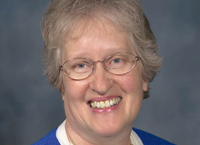The UNMC College of Medicine is one of 12 institutions to partner with Harvard University in a four-year study to determine factors that influence the medical careers of women of color.
The study, titled “Factors that Promote and Support Careers of Women of Color in Academic Medicine,” will help researchers understand how individuals and academic institutions, such as UNMC, contribute to the advancement of women of color as members of medical school faculties.
 |
Myrna Newland, M.D. |
 |
Phyllis Nsiah-Kumi, M.D. |
 |
Rubens Pamies, M.D. |
Funded by a grant from the National Institutes of Health, the study will include participants from black, Hispanic, American Indian/Alaskan Native and Asian American backgrounds.
Myrna Newland, M.D., director of UNMC’s Equity Office and professor of anesthesiology, and Phyllis Nsiah-Kumi, M.D., assistant professor of internal medicine and pediatrics, will be co-liaisons for UNMC during the study. Rubens Pamies, M.D., vice chancellor for academic affairs, will serve as a member of the institute national advisory committee and contact person for UNMC.
“The first component of the study will be to analyze the demographics and institutional policies in place for each organization,” Dr. Nsiah-Kumi said. “This will give participating organizations the opportunity to see how they compare with other institutions around the country.”
Researchers hope that by analyzing specific challenges and opportunities facing women of color, institutions will be able to make more informed decisions regarding program design and faculty development.
“Often in studies, all women, regardless of ethnicity, are categorized as one minority group,” Dr. Pamies said. “This research will contribute significantly to what we understand about the unique variables facing women of color specifically.”
Data will be collected from institutional assessments and faculty assessments composed of interviews and a Web-based survey scheduled to begin development and distribution in January 2011.
“It’s important that we cultivate a cadre of diverse women of color in academics,” Dr. Nsiah-Kumi said. “Doing so not only benefits the students, but also the surrounding community.”